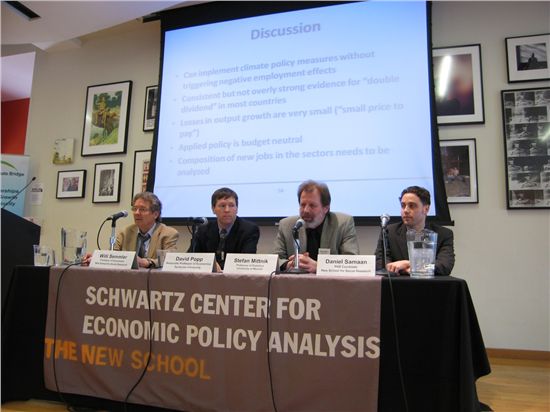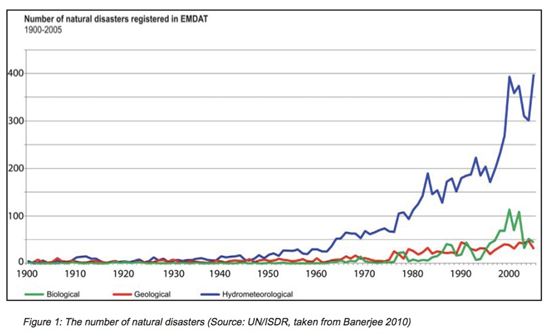Purpose
- Investigates the effect of the global financial system and/or the monetary system in fostering a sustainable economy.
- Investigates causes tending to destroy or impair the free-market system.
Summary
The 2009 United Nations Climate Change Conference in Copenhagen has been perceived as a failure, while the consequences of global warming continue to mount. The leading nations of the world, however, hesitate to commit themselves to climate change mitigation measures. Attempting to establish both the urgency of the issue and to help overcome the standoff in international negotiations, The New School hosted a high level international conference on the “Economics of Climate Change” on April 9 -10, 2010.

Panel discussing an employment study presented at the conference. A gain in employment was observed for low carbon industries compared to high carbon emission industries. Photo by Barrett Walker.
Description
The conference was organized by Willi Semmler, professor of Economics at The New School for Social Research. It was jointly sponsored by the Economics Department and the Schwartz Center of Economic Policy Analysis, and generously supported by the Walker Foundation, the Thyssen Foundation and the German Consulate. The conference brought together well-known academics and influential policy advisors as well as policy makers of different countries. Among the most prominent participants from abroad were Damien Meadows, Head of the Unit International Carbon Markets at the European Commission, Ulrich von Weizsäcker, a former member of the German Parliament, and Hirofumi Uzawa from Japan, author of a ground breaking work on global warming. Renowned international economists Alfred Greiner of Germany and Franz Wirl of Austria also participated. The United States was represented by top policy analysts, geoscientists, and economists, including: Michael Oppenheimer from Princeton; Michael Greenstone from MIT; Peter Schlosser and Geoffrey Heal from Columbia; Klaus Keller from Pennsylvania State; Ali Khan from Johns Hopkins University; and Edward Nell, Willi Semmler and Lopamudra Banerjee from The New School for Social Research. The agenda of the conference can be downloaded from www.newschool.edu/scepa.
A report by a research team directed by Stefan Mittnik and Willi Semmler was presented that studied the impact of mitigation policies on employment. The report identified that certain mitigation policies might generate a double dividend and not necessarily reduce economic growth or employment. Researches concluded that only a few countries will experience a slight reduction of growth and employment. Overall, employment and output is likely to rise if the income from a carbon tax or cap and trade are used to subsidize less carbon intensive industries or develop renewable energy sources.
The conference revealed a professional preference for dealing with climate change. Economists tended to suggest a carbon tax as the main pillar of serious global and national mitigation policies, while politicians and policy advisors shied away from taxes and the double dividend argument. Economists argue, however, that the problems associated with cap and trade - high price volatility, perverse incentives, unfairness between developed and developing countries, and its bad performance in history - are not well understood. All participants agreed on one thing: the need for the United States to abadon its hesitation on climate change and take a leadership position both at home and abroad.

Purpose
This conference investigated the unresolved tensions between economic growth and environmental damage, which continue to pose a threat to domestic and global markets.
Scope
The conference addressed five fundamental questions:
1. Where does the world’s climate now stand with respect to global warming? Are we already at or beyond the “tipping point” beyond which there is no return?
2. What can economists tell us about the costs and benefits of mitigation policies? What measures are most efficient from an economic perspective and in terms of carbon reduction? Proposals include cap and trade, carbon tax, development of renewable energy, new technologies, energy efficiency and changing the patterns of consumption.
3. How can we best address the employment effects of these diverse climate proposals given the fragile states of the world economies?
4. How does international policy ensure justice and fairness in global warming policy measures? To what extent do the proposed measures imply a just distribution of burdens and benefits for developing countries?
5. If mitigation policies are too little and/or too late, what are realistic adaptation strategies that address the needs of poor countries and poor areas of rich countries burdened more than others?
Project Link www.newschool.edu/scepa
Amount Approved$25,000.00
on 11/23/2009
(Check sent: 12/15/2009)